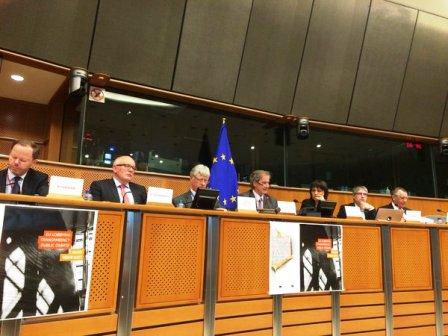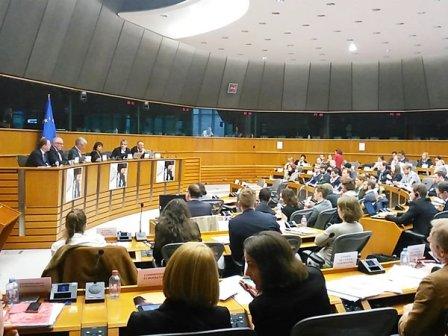 Stakeholders were invited to have their say about the current Transparency Register and future options at a joint event at the European Parliament on 2 May 2016, hosted by Parliament’s Vice-President responsible for the Transparency Register, Sylvie Guillaume, and the First Vice-President of the Commission, Frans Timmermans.
Stakeholders were invited to have their say about the current Transparency Register and future options at a joint event at the European Parliament on 2 May 2016, hosted by Parliament’s Vice-President responsible for the Transparency Register, Sylvie Guillaume, and the First Vice-President of the Commission, Frans Timmermans.
EU institutions interact with a wide range of groups and organisations representing specific interests. This is a legitimate and necessary part of the decision-making process, which helps EU policies to reflect citizens’ real needs. This decision-making process must be transparent to allow for proper scrutiny and to ensure that the Union’s institutions are accountable. The European Parliament and the European Commission are committed to be open to the groups and organisations with which they interact, and have set up a joint Transparency Register. The EU Transparency Register, run by the Parliament and the Commission, is a voluntary system of registration for entities seeking to directly or indirectly influence the EU decision-making process. It covers all organisations and self-employed individuals from trade and professional associations to NGOs and think tanks, irrespective of their legal status.
On 1 March, the Commission launched a 12-week public consultation to gather input on the current regime for registration of interest representatives who seek to influence the work of the EU institutions and on its development into a mandatory lobby register covering the European Parliament and Council of the European Union as well as the Commission. The Commission is committed to increased transparency, in the way it operates and in European Union decision-making overall. In that context it has announced its intention to propose improvements to the Transparency Register, which is a tool, put in place by the European Parliament and the European Commission to cast light on lobbying activities seeking to influence European policy-making. This public consultation has a twofold objective: (1) to gather views on the functioning of the current Transparency Register and (2) to receive input for the design of the future mandatory regime of registration announced in President Juncker’s Political Guidelines.
In that respect, First Vice-President Frans Timmermans had said: “This Commission is changing the way we work by consulting stakeholders more and by being open about who we meet and why. We need to go further by establishing a mandatory register covering all three institutions, ensuring full transparency on the lobbyists that seek to influence EU policy making. A European Union that is more transparent and accountable is a Union that will deliver better results for citizens.”
Vice-President Timmermans started his contribution by urging the decision-makers and stakeholders to make this year the year of transparency. He firmly believes that the best option to get together all the three institutions in order to enhance transparency, is to promote the inter-institutional agreement and if it works out, the Council might be convinced that the legislation can be a useful instrument. On local and regional authorities he will revise the position to ensure LRGs are treated the same way as other public authorities, taking always into consideration the differences across member states.
 Commissioner Timmermans believes in a mandatory EU transparency register with sanctions for organisations that do not abide by the rules. In addition to this, Ambassador Pieter de Gooijer agrees that Council should be included in register but warns sanctions will be tricky. But who should be in the register in terms of the Commission? Commissioner Timmermans said he is not convinced that all Commission officials should be in that register and further explained that we have to make sure that the decision-makers are on that list.
Commissioner Timmermans believes in a mandatory EU transparency register with sanctions for organisations that do not abide by the rules. In addition to this, Ambassador Pieter de Gooijer agrees that Council should be included in register but warns sanctions will be tricky. But who should be in the register in terms of the Commission? Commissioner Timmermans said he is not convinced that all Commission officials should be in that register and further explained that we have to make sure that the decision-makers are on that list.
Vice-President does hope we can use this period of time to improve things, and concerning the leaks on TTIP he mentioned that they simply confirm that the Commission and the European side as such has been very transparent on the documents and admitted that the differences between the EU and US are stimulus for the EU to be as transparent as possible. “We deserve recognition because on international negotiations we are more transparent than ever before” stated Vice-President Timmermans.
He pointed out that we have to reconnect with very sceptical citizens about the nature of our legislation and legislature, and underlined the improvement of the relations between the Commission and the European Parliament. He concluded by emphasising that transparency is not a panacea and will not solve all problems of legitimacy, but transparency will increasingly be an essential element of modern governance, and improve the quality of the legislation, the accountability and the knowledge of the MEPs, national officials and Commission officials. “There is no such thing as good or bad lobbying- “A business is not less legitimate than an NGO”.
